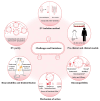Role of probiotic extracellular vesicles in inter-kingdom communication and current technical limitations in advancing their therapeutic utility
- PMID: 39697628
- PMCID: PMC11648425
- DOI: 10.20517/evcna.2024.39
Role of probiotic extracellular vesicles in inter-kingdom communication and current technical limitations in advancing their therapeutic utility
Abstract
Diverse functions of probiotic extracellular vesicles (EVs) have been extensively studied over the past decade, proposing their role in inter-kingdom communication. Studies have explored their therapeutic role in pathophysiological processes ranging from cancer, immunoregulation, and ulcerative colitis to stress-induced depression. These studies have highlighted the significant and novel potential of probiotic EVs for therapeutic applications, offering immense promise in addressing several unmet clinical needs. Additionally, probiotic EVs are being explored as vehicles for targeted delivery approaches. However, the realization of clinical utility of probiotic EVs is hindered by several knowledge gaps, pitfalls, limitations, and challenges, which impede their wider acceptance by the scientific community. Among these, limited knowledge of EV biogenesis, markers and regulators in bacteria, variations in cargo due to culture conditions or EV isolation method, and lack of proper understanding of gut uptake and demonstration of in vivo effect are some important issues. This review aims to summarize the diverse roles of probiotic EVs in health and disease conditions. More importantly, it discusses the significant knowledge gaps and limitations that stand in the way of the therapeutic utility of probiotic EVs. Furthermore, the importance of addressing these gaps and limitations with technical advances such as rigorous omics has been discussed.
Keywords: Extracellular vesicles; bacterial extracellular vesicles; inter-kingdom communication; membrane vesicles; outer membrane vesicles; probiotic extracellular vesicles; species crosstalk.
© The Author(s) 2024.
Conflict of interest statement
All authors declared that there are no conflicts of interest.
Figures




References
-
- Hill C, Guarner F, Reid G, et al. Expert consensus document. The International Scientific Association for probiotics and prebiotics consensus statement on the scope and appropriate use of the term probiotic. Nat Rev Gastroenterol Hepatol. 2014;11:506–14. doi: 10.1038/nrgastro.2014.66. - DOI - PubMed
Publication types
LinkOut - more resources
Full Text Sources
Miscellaneous
